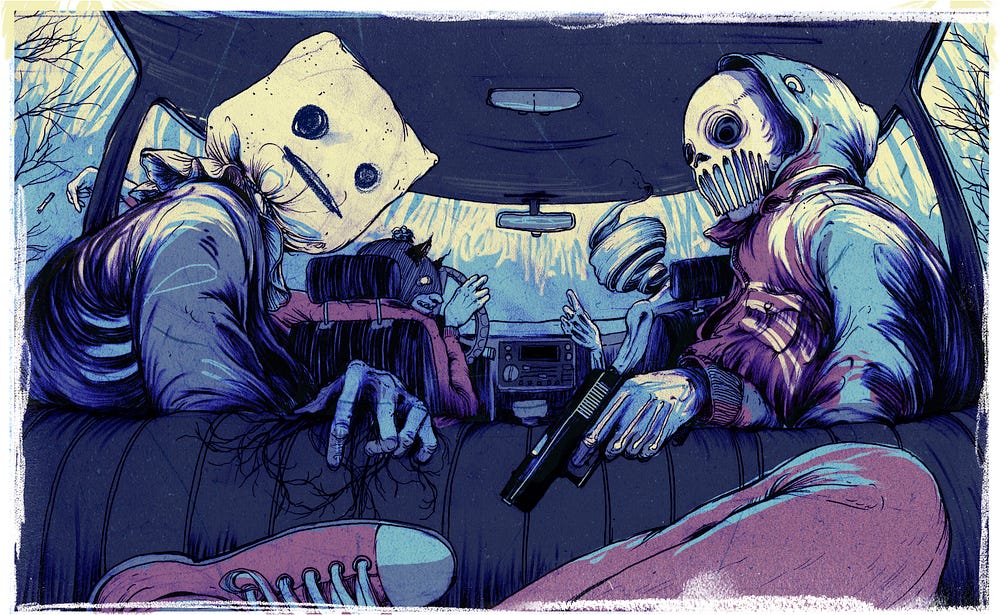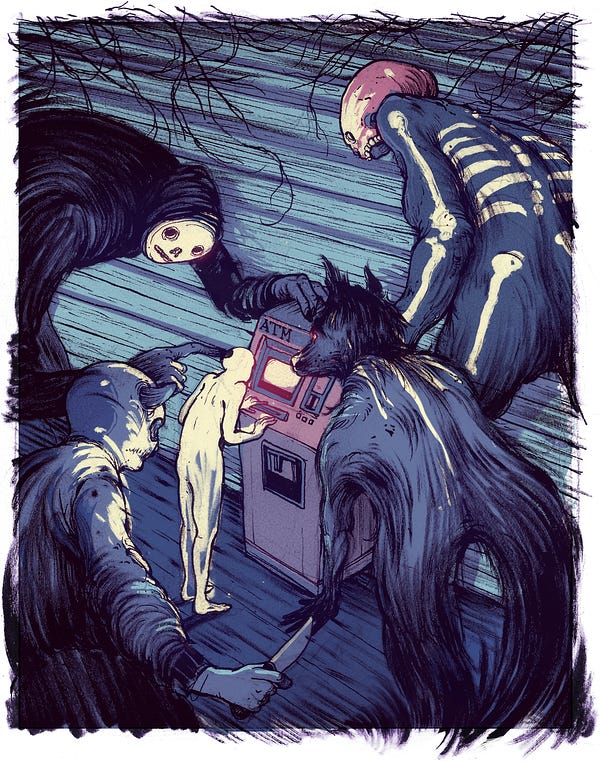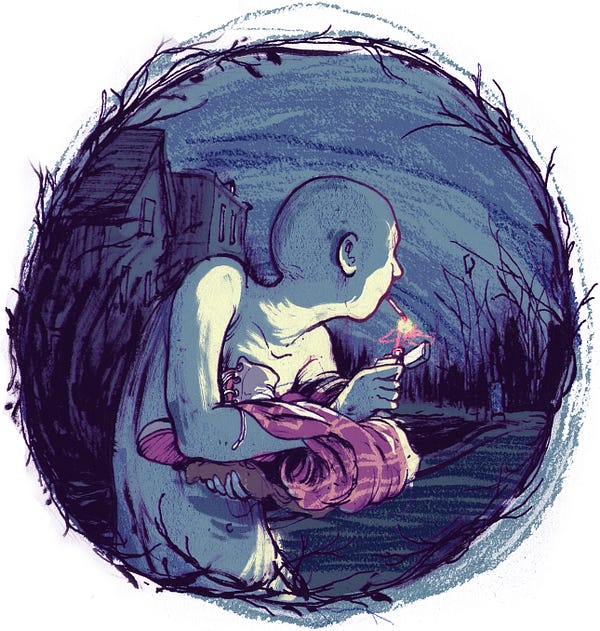“Nope, You’re Dead Now” — Matter — Medium
“Nope, You’re Dead Now”
I was kidnapped, beaten, and almost set on fire. But, hey, it’s made me a happier person.

Illustrations by Pat Perry

The bad thing came from nowhere. The city I lived in — Manchester, England — was known as “Gunchester” then: Kids shot in pie shops, stabbings in the clubs. I knew people who dealt in quantities of drugs that you had to lift at the knees. It was the sort of dark money that skews people.
Under the street light ahead, a car pulled up, just a normal car — a Volvo hatchback, like my Grandad had. A few figures got out, moved around, crossed the road. I was right around the corner from home, but before I’d really noticed, they were in my face and at my back. There was a surprisingly not-all-that-cold blade at my throat, and something hard and pointed in the small of my back. “Get in the car,” they insisted. They opened the trunk. “Get in or you’re fuckin’ dead here.”
I tumbled in. And for the next two hours I was their prisoner.
Being kidnapped was a constant experience. It had episodes, it had specific moments, and I can relate them — but those are going to seem like discrete bits of a story. Being kidnapped didn’t feel like that. It felt like the longest now ever.
Here are some things that happened.
Beatings, prolonged and savage with the backs of knives and fists.
Taunting. “What race are we?” “Are you scared?” “You’re fucking shitting it, eh?”
Robbery. They took my wallet, and we drove to an ATM, withdrawing everything possible until the machine grabbed the card. I was young, I worked in a law firm sorting records and managing backups: There was almost nothing in there.

Attempted burglary. After the card was drained, they switched their attention to where I lived. So I made up an address in the hope that they’d try to get in, fail, the residents would be spooked, call the police. I picked a road near where I lived with bigger houses — houses with burglar alarms, houses where the police would rock up swiftly. I picked a number that sounded reasonable. Off we went, until we reached the made-up address.
“What color is your front door?”
Fuck.
“White.”
“Nope, you’re dead now.”
Gunplay. At this point the car was driven onto rough ground. There were voices outside the car, and the trunk was opened. They made me strip naked. It was winter. It was cold.
Attempted immolation. A can of gas was produced. Was it in the car before? There wasn’t much in it. Just enough to splash over me, and the inside of the car. I was bundled back in, the doors slammed, a lighter was struck and tossed in through an open window.
The sound of running feet crunching on rubble.
Then quiet.
I became aware of my own breathing.
Escape. I clambered over the backseats, grabbed some of my clothes that were still in the car (Trousers? Coat? Shoes? I don’t remember). I looked around the car, saw an unlit Zippo. I pulled on my jeans, jumped out of the car, and ran or crept — possibly both — toward some nearby streetlights.
I looked around. I was about 100 yards from where I started. This was disorienting.

Everything that happened afterward is really part of the same experience for me: going home, panicking, calling the police, running around the house with the biggest kitchen knife I could find. My housemate, who was stoned, was finding it very hard to understand what I was doing, saying, how I was acting. I called the cops — “I’ve been abducted” — and the response on the other end of the phone was initially cool, almost bored. I suppose they’re trained to be calm, but it felt like the first reaction I was getting was some sort of wry disbelief. When I told them the car’s license plate, the whole experience changed: “Repeat that number for me please, slowly and clearly,” and then, a few seconds later, “I’m transferring you to the incident room.” After a bizarrely precise series of questions, I was told to stay on the line — seconds later the noise of a helicopter, and a series of blue lights racing past toward the location of the dumped car. I went to the front door and stood there, bread knife in my shaking hand as the street filled with police cars and vans.
It turned out the car’s owner — a guy I vaguely knew — had been carjacked outside his house late that afternoon. He and three others had been lifted from the street, like me, had their bank accounts cleared, like me. But then — unlike me—they had been dropped off. I was the only one held for much time, the only one they tried to kill.
In a way, I am still deeply glad for that — not that it happened to me, of course, but that it didn’t happen to anyone else.
I remember, in between a couple of sessions of pistol-whipping, that I could mentally step back from my own experience. I could acknowledge my own mental state, how my initial adrenaline spike had colored how it felt, and how — now that this rush of sheer terror was passing — actually, yeah, I am dealing with this. I am still functioning. And I had no regrets. It was possible that I wasn’t going to see another dawn, but I was okay with that. Not happy exactly, and if I could avoid it, great, but it looked like it was the end of things, and I had the space and the peace inside to figure it had been mostly fun, and if that’s all I’m getting, then I don’t feel all that cheated. After that insight, the rest of the evening seemed to glide by, almost. I didn’t lose my shit, and I thought that most people I knew might well have lost their shit. And that would be bad for them, maybe worse than what I was experiencing.
I went along to an ID parade a few weeks later, but in reality I’d never seen their faces. I didn’t even really have a good idea of their builds.
There was a court case, I think, but by then I’d tried to move on. I wasn’t called on to give evidence. The whole tale was written down in detail by a great guy at the law firm where I worked, and they helped me get compensation. That bought a suit, a cigar, and a week snowboarding.
For all my stoicism, the cracks showed quickly. I was jittery, hypervigilant, distracted, and constantly exhausted — almost like jet lag — for about 72 hours. After that I assumed I was back to normal, but it’s clear in hindsight that I was anything but. I went back to the law firm, but I had no concentration at all. The simple, manual nature of most of my work was a blessing: Anything more complicated than “fetch this list of files from the vaults” completely overwhelmed me. I tried socializing again, but clubs and pubs just felt like rooms full of threat. Within a few weeks I was actively shedding friends, distancing myself from more casual acquaintances, and acting distinctly offish with closer friends.
It took a little while. I tried Prozac to deal with the anxiety, but decided that a mild sense of natural unease was preferable to feeling sick and confused. In the end, I really turned stuff around. It wasn’t conscious. Certainly not a case of feeling I had a second chance, but in the back of that car I had decided that I was okay with things ending there, and so everything else was a bonus.
Suddenly, enjoying life for its own sake became my focus. Up until then my life had largely been means to ends — at school I’d studied enough to get into the Navy, at college I’d done enough to get a job. After this happened, I started to do things because they were interesting to me, fun in their own right, worthwhile to me on my terms and nobody else’s. I wasn’t doing things to impress anyone else, or so that I could get to the next thing, the thing beyond.
I have a strange kind of resilience these days, a baseline “Hey, cool, not dead yet!” about life. People compliment me on my optimism, but then catch themselves — it isn’t optimism, I really don’t think things are better than they are. But I do recognize the positive aspects of reality. And I take the time to look them square in the eye.
I don’t like big crowds, don’t like the trunks of cars. And I’m cautious about nocturnal flaneurism: I still like walking around cities at night, but it’s as well to know they can bite.
Follow Matter on Twitter | Like us on Facebook | Subscribe to our newsletter

